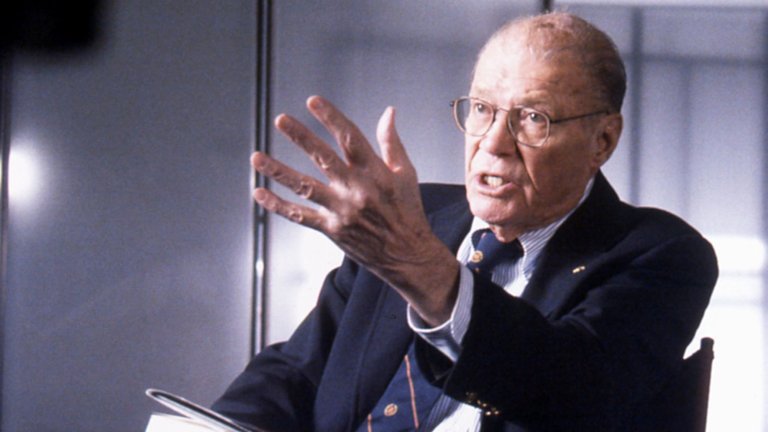Film Review: The Fog of War (2003)

With each passing years 20th Century is becoming as abstract and unfathomable to new generation as Middle Ages or Classical World once were. The only difference is the technology that allowed abundance of records, data, and, more importantly, ability for participants of crucial historic events to tell their story in more direct, forthcoming and sometimes more effective ways that copies of ancient manuscripts could ever do. One of the more fascinating examples can be provided by The Fog of War, 2003 documentary film directed by Erroll Morris.
20th Century is often described as “American century” and the film’s protagonist Robert S. McNamarra (1916 – 2009) can be viewed as embodiment of both the America’s greatest triumphs and the America’s greatest tragedies in the period. Born in the relative modest Irish American family in California, he excelled in school and later graduated at University of California, Berkley. During the Second World War he joined United States Army Air Force, where his analytical mind caught attention of General Curtis Le May who would give him the task of planning strategic bombing against Japan, a campaign that ultimately claimed more civilian lives than nuclear attacks on Hiroshima and Nagasaki. After the war he caught attention of Ford Motor Company which hired him as one of its executives, and he advanced to its president, being later credited by turning it into one of powerhouses of America’s post-WW2 industrial boom. When John F. Kennedy became president in 1961, he was not only impressed by his record and abilities, but also saw him as belonging to his own generation and embodying the vision of new, young, smart and powerful America. McNamarra was appointed as Defense Secretary and played large role in Cuban Missile Crisis, but his next challenge – Vietnam War – turned out to be his downfall. His analytical mind, that served him so well in conventional wars and big business, failed to properly grasp realities of the conflict and, as the initially popular war turned into quagmire, public turned against him as the war’s most noticeable figure in the administration. In 1968 McNamarra was sacked or, according to his claims, resigned in order to be appointed to the chairmanship of World Bank, where he remained until 1981. McNamarra has spent the rest of this trying to address his controversial record in Vietnam, admitting some mistakes while justifying some of his moves.
Errol Morris, one of the most America’s most celebrated documentary film makers, was fascinated by McNamarra, because both men attended Berkeley. Morris had original idea to cover McNamarra’s 2001 book Wilson’s Ghost for television special. He interviewed McNamarra. The interview took number of days and during which Morris used his device called “Interrortron”, which creates illusion of interviewer and interviewee looking straight into each other. Impressed by the material, Morris decided to use footage for feature film. Morris structured film from what he called “Eleven Lessons from the Robert S. McNamarra”, which serves as the subtitle of the film. Morris illustrates McNamarra’s words with combination of documentary footage, couple of optical tricks and hauntingly atmospheric music score by Phillip Glass.
The Fog of War was being produced during the build up towards invasion of Iraq, which was, just like the Vietnam War four decades earlier, initially greeted near unanimous enthusiasm within US public. Morris might have sensed that the whole affair might result in similar manner or not, but the comparisons between two conflicts are inescapable and the film can be viewed as some sort of warning, using the words of controversial elder statesman as an advice how to evade tragic mistakes in Indochina that created millions of dead, traumatised entire generation and divided not only nation but McNamarra’s own family. McNamarra, despite advanced age, is not only lucid, but well-spoken, perceptive, intelligent and rarely combative, even when he refuses to take responsibility for some of the blunders he has been accused of. The film chronicles his film in chronological fashion, thus avoiding confusion of the audience, although The Fog of War would still best appeal to the audience with deeper knowledge about Second World War, Cold War and Vietnam. By the time Morris’ film came to cinema, US public, or at least Hollywood, slightly began to shift opinion against the war and implied critical stance towards US military decision making in the past could have been interpreted as endorsement of similar criticism in the present. The Fog of War was hailed by critics and won Oscar for Best Documentary Feature. McNamarra apparently wasn’t completely content with the way Morris interpreted his work, so he added his own “lessons” on Special Edition DVD. In 2014 Morris interviewed McNamarra’s successor Donald Rumsfeld, the architect of Iraq War, for documentary called The Unknown Known, which is often seen as spiritual sequel to The Fog of War.
RATING: 6/10 (++)
Blog in Croatian https://draxblog.com
Blog in English https://draxreview.wordpress.com/
InLeo blog https://inleo.io/@drax.leo
InLeo: https://inleo.io/signup?referral=drax.leo
Unstoppable Domains: https://unstoppabledomains.com/?ref=3fc23fRc42c1b417
Hiveonboard: https://hiveonboard.com?ref=drax y
Bitcoin Lightning HIVE donations: https://v4v.app/v1/lnurlp/qrcode/drax
Rising Star game: https://www.risingstargame.com?referrer=drax
1Inch: https://1inch.exchange/#/r/0x83823d8CCB74F828148258BB4457642124b1328e
BTC donations: 1EWxiMiP6iiG9rger3NuUSd6HByaxQWafG
ETH donations: 0xB305F144323b99e6f8b1d66f5D7DE78B498C32A7
Posted using CineTV
Sei veramente bravo a scrivere! Mi ha colpito molto questa recensione, chapeaux
!LUV
!COFFEE
!PIZZA
drax, li-lou sent you LUV. 🙂 (3/3) tools | trade | connect | daily
Made with LUV by crrdlx.
$PIZZA slices delivered:
@li-lou(2/5) tipped @drax